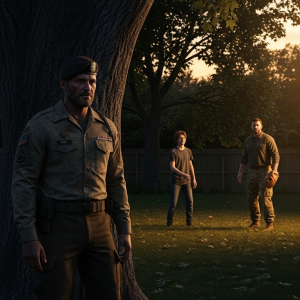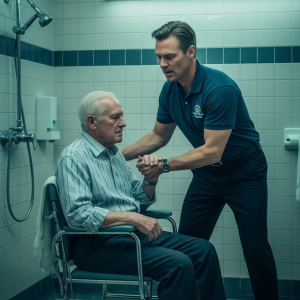Ethan Hayes lived a life of clean lines and right angles. As a successful young architect, his world was one of concrete, glass, and steel—materials that were honest, predictable. He designed buildings that imposed order on the chaos of the city. It was a career, he often thought, born from a subconscious need to build a solid, unshakeable world around a childhood that had been shattered into a million pieces.
Every morning, he walked the twelve blocks to his downtown office. And every morning, he passed the man on the corner of Grant and 8th. The man was a fixture, a piece of the city’s grim furniture. He was homeless, his face a roadmap of hardship, his clothes little more than rags. But what set him apart was his occupation. He sat on a flattened cardboard box, a bucket of charcoal sticks beside him, and drew, his focus absolute.
He never drew the people or the buildings. He drew a single, obsessive theme: mangled, twisted metal. Cars, contorted into shapes of agony, their headlights like vacant, staring eyes. The drawings were unsettling, brilliant in their raw, chaotic energy. Ethan, a man who appreciated form, would sometimes slow his pace, strangely mesmerized by the violent beauty of the man’s art.
The ghost of his own past was a quiet, well-managed tenant in the back of his mind. He was only six when it happened. A winding mountain road, rain, and then… nothing. He’d woken up in a hospital, the sole survivor of a crash that had claimed both of his parents. His only memories were disjointed, nightmarish fragments. The blinding glare of headlights that didn’t seem to belong to the oncoming lane. A second, jarring impact, a shriek of metal on metal that felt separate from their own car’s skid. The doctors had called them false memories, trauma-induced phantoms.
His Uncle Robert had saved him. Robert, his father’s younger brother and business partner, had swept in, a titan of grief and strength. He had taken the broken pieces of his brother’s life—a failing business and an orphaned son—and had miraculously built an empire from them. He raised Ethan as his own, providing him with everything. A loving home, the best education, unwavering support. “Everything I have, Ethan,” Robert would often say, his arm around his nephew’s shoulders, “I built it to honor your father’s memory. To give you the life he would have wanted for you.”
Robert never wanted to talk about the crash. “It’s too painful to revisit, my boy,” he’d say, his eyes misting over with a convincing sorrow. “We must look forward, not back.” And Ethan had obeyed, building his future on the foundation of his uncle’s kindness, never questioning the clean, straight lines of the story he’d been told.
It was a Tuesday afternoon, the sky the color of a fresh bruise, threatening rain. Ethan was walking home, his mind preoccupied with the stress analysis of a new skyscraper. As he approached the corner of Grant and 8th, he noticed the homeless artist, whose name he’d learned was Samuel, was not drawing. He was sitting perfectly still, his eyes fixed on Ethan with a terrifying, feverish intensity.
As Ethan drew level, Samuel slowly, deliberately, held out a piece of paper, folded into a neat square. It wasn’t a cup for money; it was an offering. Ethan hesitated, an inexplicable sense of dread washing over him. He took the paper. It was heavy, textured, the charcoal smudging his fingertips.
He walked a few more steps before his curiosity got the better of him. He stopped under a streetlamp and unfolded the drawing.
The city around him dissolved. The sounds of traffic faded into a dull, distant roar. He was looking at a ghost. Rendered in horrifying, hyper-realistic detail, was the scene of the accident. He recognized his father’s old sedan, its front end crumpled against a guardrail, the dark, yawning chasm of the ravine below. It was a perfect, terrible recreation of the worst moment of his life.
But there was something else. A detail that had never appeared in any police report, a detail that lived only in his most fractured nightmares. In the drawing, a second car, a sleek, black sedan, was depicted alongside his family’s car. It wasn’t just near it; it was ramming into its side, its front bumper aligned with the rear passenger door, brutally pushing it towards the edge.
His heart hammered against his ribs. This was his nightmare, given form. This was the “second loud noise.” He spun around, his mind a whirlwind of confusion and shock, ready to demand answers from the artist. But Samuel was already shaking his head, his expression one of profound, weary sorrow. He slowly raised a trembling hand and pointed to the drawing in Ethan’s hand. He made a small, flipping gesture.
With numb fingers, Ethan turned the paper over.
On the back was another drawing. Not of a car, but of a face. A portrait, so precise and full of life it seemed to breathe on the page. It was the face of the man in the passenger seat of the black sedan, seen through the driver’s side window, his features illuminated in the hellish glare of the crash. His mouth was open, as if shouting an order. And it was a face Ethan knew better than his own.
It was the face of his Uncle Robert, twenty years younger.
The drawing slipped from Ethan’s grasp. He stared at Samuel, who was now wracked with a deep, hacking cough. The old man looked up, his eyes swimming with a pain that went far beyond his physical illness. He finally spoke, his voice a ragged, broken whisper that was almost lost in the city’s hum.
“I… I drove that car,” Samuel rasped, each word an agony. “He was next to me. Your uncle. He made me do it.” He coughed again, a terrible, wet sound. “I’m dying. A man… a man needs to make things right before he dies. You deserve the truth.”
The truth was a poison. It seeped into Ethan’s bloodstream, turning the world he knew into a grotesque, unfamiliar landscape. The twenty years of his life, which he had seen as a story of tragedy and rescue, was suddenly reframed as a monstrous, elaborate lie. The foundation of his world was not just cracked; it had been a hollow facade from the very beginning.
He found Samuel later that night in a homeless shelter, sicker than ever. Ethan, his mind still reeling, had the presence of mind to turn on the voice recorder on his phone. For two hours, he listened as Samuel, a former truck driver with a gambling problem, confessed everything. He told a story of a crushing debt owed to a ruthless businessman named Robert Sterling. A debt Robert had offered to forgive, in exchange for a “job.”
“He said it would be simple,” Samuel’s recorded voice whispered. “Just a nudge. Run your brother’s car off the road. Scare him a little. Make him think twice about calling in my debt. But when we got up there, on that road… he changed. It was like a demon got inside him. When I made the first hit, he screamed, ‘Harder! Put them over the edge!’”
Samuel had been paid handsomely, but the blood money had turned to ash in his hands. Haunted by the faces in the car, by the child he knew had been in the back seat, his life unraveled. He drank, he lost his job, his family, everything. His obsessive drawing was not art; it was a penance, a daily, compulsive confession to a world that never looked close enough to see it.
The next day, Ethan went to his uncle’s house for their weekly dinner. Every painting on the wall, every piece of expensive furniture, every brick in the magnificent mansion now seemed to be cemented with his parents’ blood. Robert greeted him with his usual booming, affectionate hug.
“Ethan, my boy!” Robert said, clapping him on the back. “You look tired. Working too hard again, I see. Remember what I always say, all this,” he swept his arm around the opulent room, “is for you. Your birthright. Your father would be so proud of the man you’ve become.”
Ethan felt a cold, reptilian dread. The kindness that had been his lifelong anchor was now a grotesque mockery. He looked into the eyes of the man who had raised him, the man who had tucked him in at night, who had cheered at his graduation, and he saw a stranger. A monster, wearing the face of his only family. He made his excuses and left early, the loving words of his uncle echoing in his ears like a curse.
Armed with the drawing and Samuel’s full, recorded confession, Ethan walked into the 17th Precinct the next morning. He didn’t ask for a desk sergeant; he asked for the head of the cold case division. The detectives listened, their expressions shifting from skepticism to intense, focused interest as he played the recording.
The old accident file was pulled from the archives. The investigation, dormant for two decades, was reborn. They found Samuel in a public hospital, dying of pneumonia. In the presence of a detective and a lawyer Ethan had hired, Samuel, with his last reserves of strength, gave a formal, videotaped deposition, confirming every detail of his story. He died two days later.
The police began to dig into Robert’s past. They discovered the massive debt he had owed his brother, a fact conveniently absent from the original investigation. They found evidence of how, in the months following his brother’s death, Robert had used a series of shell corporations to absorb the company’s assets, emerging as the sole owner of a “new,” miraculously profitable enterprise. The motive was no longer theoretical; it was a trail of numbers on twenty-year-old financial statements.
The arrest happened a week later, at dusk. Ethan stood across the street, a silhouette in the falling light, as two unmarked police cars pulled silently into the long, curved driveway of his uncle’s mansion. He watched as the detectives approached the door, as a stunned Robert was led out, his face a mask of disbelief and confusion.
He saw the moment Robert’s eyes found him, standing across the street. In that split second, across the manicured lawn that his parents’ deaths had paid for, Robert’s confusion curdled into a look of pure, venomous hatred. The mask of the loving uncle was gone forever, and in its place was the face from the drawing: the face of a killer, his mouth open in a silent, furious snarl.
The destruction was absolute. The respected philanthropist and business leader was exposed as a fratricidal monster. His empire, built on a lie, began to crumble. Friends and partners deserted him. The socialite who had ruled the city’s elite circles was now just a man in an orange jumpsuit, his name a byword for the ultimate betrayal. For Ethan, watching the blue and red lights flash against the stone facade of the house of lies, there was no triumph. There was only the cold, hollow echo of justice, finally, terribly, served.
The trial was a media sensation, but for Ethan, it was a long, painful exorcism. Robert was found guilty on all counts and sentenced to life in prison without the possibility of parole. With the verdict, a twenty-year-old wound in Ethan’s soul could finally begin to scar over.
As his father’s sole heir, the assets of the company, now disentangled from Robert’s corrupt dealings, reverted to him. He inherited an empire, but he had no interest in being the king his uncle had been. He walked away from his architectural firm and took the helm of his father’s company, not as a CEO, but as a restorer.
He began the slow, arduous process of rebuilding it according to the principles his father had valued: integrity, quality, and a commitment to his employees. He sold the gaudy mansion and the fleet of luxury cars, investing the money back into the business and the people who made it run.
But his most important work was done outside the boardroom. With a significant portion of the company’s restored profits, he established a new non-profit organization. He called it “The Samuel Foundation for the Voiceless.” Its mission was twofold: to provide shelter, medical care, and a path back to society for the city’s homeless population, and to offer legal protection and financial support for witnesses of serious crimes who were too afraid to come forward.
“Samuel gave me the truth,” Ethan explained to the foundation’s new director, “but he lived in hell for twenty years to do it, because he believed no one would listen to a man like him. This foundation isn’t just about charity. It’s about giving a voice to the ghosts on the corner, the ones who see everything but are never heard.”
Ethan never remarried the past to the present with bitterness. The truth, as devastating as it was, had liberated him. He had found justice for his parents and a final, quiet peace for the guilt-ridden soul of Samuel. He took the broken lines of his own life, the twisted wreckage of his past, and he built something new. Something strong. Something that provided shelter. He was no longer just building with concrete and steel; he was rebuilding with purpose, transforming a dark legacy of betrayal into a lasting monument of hope.




